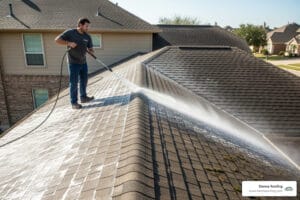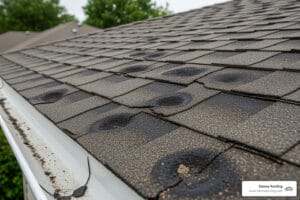How much do roof costs for a new roof vary? On average, homeowners spend between $5,400 and $19,800 on a new roof, but the final price can vary based on materials, labor, and local rates. This guide provides a detailed breakdown of costs to help you better plan your roofing project.
Key Takeaways
- Roof replacement costs in 2024 can range from $5,400 to $19,800, with an average of about $9,072, influenced by factors like materials, labor, and roof size.
- In Houston, average roof replacement costs are higher, around $18,000, reflecting local conditions such as climate and material availability.
- To save on costs, homeowners should shop around for quotes, consider off-peak seasons for replacement, and choose durable materials suited to their area’s weather.
- Regular roof repair and maintenance can help extend the life of your roof and reduce overall replacement costs.
How Much Does a New Roof Cost?
A Comprehensive Guide to Pricing
In the year 2024, the expense associated with installing a new roof can show substantial variation due to aspects including roof material, labor intensity, and geographic location. Homeowners might anticipate shelling out anywhere from $5,400 to $19,800 for roof replacements. The national average tends to settle at approximately $9,072. This wide price spectrum underscores how critical it is to take into account every influencing factor when setting aside funds for expenses associated with obtaining a new roof.
Comprehending these expenditures is crucial for strategic financial planning and ensuring that you receive optimal value from your investment in a new roofing system. The overall cost can be greatly influenced by elements such as your roof’s dimensions, the selected roofing materials’ quality and type along with prevailing rates charged by local labor forces. Dissecting each component provides enhanced insight into anticipated costs.
Introduction
Understanding the expenses involved in roof replacement is crucial for homeowners from Houston, Texas, to other regions. The condition of your existing roof can significantly influence the overall cost, as repairs or partial replacements may be necessary. A durable and well-maintained roof serves not just as a safeguard for your home’s structural integrity, but also bolsters its potential market value. By getting to grips with the nuances of roof replacement costs, homeowners can navigate their financial planning more adeptly and be ready to tackle any unforeseen expenditures head-on.
The intricacies that impact roofing costs are unpacked within this guide, providing an extensive analysis of what homeowners should anticipate budgeting-wise. Regardless of whether it’s coping with Houston’s intense heat or contending with erratic weather conditions elsewhere, having insight into these replacement costs equips you to strategize your finances better and select options that align perfectly with your residential roofing requirements.
Average Cost of a New Roof in Houston, Texas
In Houston, Texas, homeowners who are planning to replace their roofs should be prepared for an average expense of about $18,000. Roof replacement costs in this area fall within the range of $10,000 and $30,000. This demonstrates how crucial it is to take into account local considerations like the availability of roof materials and labor costs when budgeting for a new roof.
On a national scale, in 2024, the typical cost to replace a roof stands at roughly $9,072. However, this amount can vary between $5,727 and $12,418. These discrepancies stem from factors such as the choice of roofing materials and the overall size of the roof. Awareness of these average replacement costs is beneficial for Houston residents as well as those elsewhere who are estimating expenses for their future roof replacement projects.
Typical Price Range for Roof Replacement
The typical price range for roof replacements in Houston is approximately $5,100 to $11,000. However, depending on the specifics of the project, homeowners might spend anywhere from $1,200 to $30,000 on a new roof. For example, replacing a roof on a 3,000-square-foot house can cost between $11,200 and $16,000, while a 1,000-square-foot house may range from $4,900 to $12,300.
Several factors influence these costs, including the square footage of the roof, the type of roofing material used, and local labor rates. For example, basic asphalt shingles are one of the most common and affordable roofing materials, with costs ranging from $5,800 to $12,700 for installation.
These variables help homeowners budget more accurately for their roofing projects.
How Local Weather Conditions Affect Costs
The climate in Houston, known for its intense heat and high humidity levels, has a substantial effect on the expenses associated with roofing. Due to extreme weather patterns and regular storm occurrences, it is essential to choose robust roofing materials capable of enduring these conditions. Metal roofing stands out as a particularly resilient choice with the potential to last up to seven decades. Although it requires more upfront investment, this option provides considerable long-term savings through reduced maintenance costs.
To selecting suitable materials like metal roofing for Houston’s climate, ensuring adequate attic ventilation plays a vital role in extending roof life by preventing moisture accumulation that can lead to damage. When homeowners invest in solutions tailored for the region’s specific climatic challenges, they can achieve significant financial benefits by minimizing the need for frequent repairs or complete roof overhauls.
Roofing Costs by Material Type
Selecting the appropriate roofing material, such as asphalt shingle, is a critical factor that significantly influences the overall cost of your new roof installation. This decision is essential for establishing what you will ultimately spend on your roof replacement. Homeowners typically encounter expenses ranging from $1,200 to as high as $30,000 when installing a new roof, where average expenditures fall between $5,100 and $11,000. Amongst popular choices are asphalt shingles, wood shakes or shingles, metal roofs and tile roofs—each offering varying price points and longevity characteristics.
Over time, there has been an upward trend in material costs. Current averages indicate prices have surged by approximately ten dollars per square foot since the early 1980s. This segment aims to delve into the pricing associated with various types of roofing materials. It intends to assist you in making a well-informed choice concerning which roofing materials best fit both your financial plan based on per-square-foot needs and preferences for your dwelling’s covering.
Asphalt Shingles
Asphalt shingles stand out as a widely chosen roofing option, favored for their cost-effectiveness and adaptability. For a roof spanning 2,000 square feet, the average expense to install asphalt shingles is approximately $2,500. The price can fluctuate between $4.25 and $8.50 per square foot while professional installation fees are in the range of $200 to $350 per square foot.
Despite being more economical compared to other materials, asphalt shingles don’t fall short on diversity or style. They come in an array of types such as 3-tab, architectural, and premium designer shingles—allowing homeowners to meet both financial constraints and design desires. Nevertheless, it’s worth noting that these shingles usually offer a service life ranging from 15 up to 30 years, which is somewhat shorter when weighed against more resilient roofing options.
Metal Roofing
Homeowners seeking a durable and long-lasting roofing solution often opt for metal roofs, which have become particularly favored due to their robustness. Metal roofing in Houston is known to endure up to 70 years, providing strong resistance against the area’s weather conditions. The investment for a metal roof falls between $6 and $12 per square foot, influenced by the specific type of metal chosen.
Aluminum, steel, and galvalume are some of the common choices available when selecting a metal roof. Each material provides unique advantages in both strength and design appeal. Despite having an upfront cost that may surpass that of asphalt shingles on a per-square-foot basis, over time, the extended lifespan and steadfast nature of metal roofing can lead to more economical expenses throughout its usage period.
Tile Roofing
Tile roofing stands out for its durability and attractive appearance, making it a sought-after choice. Roofing materials like concrete tiles and clay tiles usually fall between $10 to $20 per square foot in cost. These popular roofing options are not only known for their robustness, but also have the potential to endure for many years.
Nevertheless, when affixing tile roofs to current buildings, there might be a need for extra structural reinforcement because of the hefty nature of these tiles. While this necessity can amplify the total expense involved with roof installations, considering the lasting advantages they provide could justify such an investment.
Roof Cost Per Square Foot
When planning for a new roof, understanding the cost per square foot is crucial. The price can vary significantly based on the type of roofing material, your location, and other factors.
For instance, asphalt shingles, a popular choice due to their affordability and versatility, typically range from $3.50 to $6.00 per square foot.
If you’re considering clay tiles, expect to pay between $8.00 and $12.00 per square foot. Slate tiles, known for their durability and aesthetic appeal, can cost anywhere from $10.00 to $15.00 per square foot.
Metal roofing, which offers longevity and resilience, generally falls between $7.00 and $14.00 per square foot. Lastly, wood shingles, which provide a natural look, usually cost between $6.00 and $10.00 per square foot.
These figures highlight how your choice of roofing material can significantly impact the overall cost of your new roof.
Factors Affecting Roof Replacement Costs
Several factors can influence the cost of a roof replacement, making it essential to consider all aspects when budgeting for your project. The size, pitch, and accessibility of your roof, along with the type and quality of roofing materials, play significant roles in determining the final cost.
Roof Size, Pitch, and Accessibility
The size of your roof is a primary factor in the cost of a roof replacement. Larger roofs require more materials and labor, which naturally increases the overall expense. The pitch, or steepness, of your roof also affects the cost. Steeper roofs are more challenging to work on, requiring additional safety measures and more time, which can drive up labor costs.
Additionally, the accessibility of your roof can impact the price. Roofs that are difficult to access may need specialized equipment and more labor, further increasing the overall cost. Understanding these factors can help you better estimate the financial commitment required for your roof replacement.
Roof Features and Complexity
The complexity of your roof can significantly influence the cost of a roof replacement. Roofs with multiple valleys, skylights, and chimneys require more labor and materials, which can increase the overall expense.
Unique features, such as curved or angled lines, may also necessitate specialized labor and materials, adding to the cost. When planning your roof replacement, it’s important to consider these complexities to ensure you have a comprehensive understanding of the potential costs involved.
Labor Costs for Roof Replacement
The expenditure on labor forms a substantial segment of the total expense associated with roof replacement, typically accounting for 50% to 70%, and averaging around 60%. This figure encompasses the cost related to installation, materials, supplies, safety measures, and debris disposal.
The dimensions of the roof and the project intricacies can affect labor expenses. An increase in roof size necessitates additional materials and manpower that consequently elevate total costs. Understanding these variables is instrumental for homeowners in estimating their full investment into a new roof. Choosing a reputable roofing company can ensure quality workmanship and potentially lower overall labor costs.
Factors Influencing Labor Costs
Labor costs for roof replacements are affected by a variety of elements. The steepness of the pitch necessitates additional safety and logistical arrangements, which raise labor expenses. These can range from $5 to $12 on average for each square foot. Expansive roofs require greater quantities of materials and involve longer installation periods, which correspondingly amplify labor charges.
Complexity in roofing design, encompassing detailed architectural details, can Elevate the cost of labor. Contractors with considerable expertise may levy increased rates related to their operational scale and established reputation.
Understanding these factors enables homeowners to more precisely calculate financial plans for their roofing undertakings.
Average Labor Rates in Houston
In the Houston area, homeowners can expect to pay between $50 and $100 an hour for roofer labor rates. These costs are subject to fluctuation based on factors like increased living expenses in certain regions and a scarcity of qualified roofing professionals.
Having an understanding of these local labor costs is beneficial for homeowners as it allows them to more accurately gauge the total expense involved in their roof replacement undertaking.
Additional Costs and Considerations
Homeowners must consider ancillary expenses that can accrue when embarking on a roof replacement endeavor. This encompasses the cost of obtaining permits, mandatory inspections, and any required repairs to underlying structures. There may be charges for disposing of old materials and re-installing or replacing gutters if they are detached during the process.
Sometimes it might only be imperative to replace portions of the roof rather than executing a full-scale entire roof replacement. Such partial replacements will have an impact on the overall expenditure. Recognizing these extra outlays is crucial for homeowners in order to plan their finances effectively and avoid unforeseen costs. Timely roof repairs can prevent more extensive damage and reduce the need for a complete roof replacement.
Permits and Inspections
In Houston, local ordinances necessitate obtaining permits for any roofing endeavor. While the cost of these permits can fluctuate, they are typically a fixed expense and should be included in the total budget calculations for the project. The specific requirement for permits is dictated by the prevailing building codes within the locality, which can vary widely.
If there are structural complications like punctures, leakage or harm to foundational components of a structure—a scenario that could escalate inspection fees—it’s crucial to anticipate all necessary permissions and inspections. This foresight helps property owners circumvent possible monetary penalties and holdups in their projects.
Roof Removal and Disposal
Removing an old roof is a labor-intensive process that can add significantly to the overall cost of a roof replacement project. The additional cost for old roof removal typically ranges from $1,000 to $1,500. Roofing contractors may charge fees for removing and disposing of old roofing materials and construction debris.
Most roofing contractors include the cost of removal in their quotes, but homeowners should budget for additional labor costs for cleanup and disposal. Clearly outlining these costs in the contractor’s quote helps prevent unexpected expenses.
Structural Repairs
During a roof replacement endeavor, if the underlying structure exhibits signs of damage such as leakage, sagging ceilings or visible rot and dampness in the boards, structural repairs may be required. The expenses associated with repairing these fundamental issues can vary widely from $364 to $1,556.
Upon removal of an old roof where decayed timbers are found, homeowners could face additional costs for replacing them that span between $1,000 and $10,000. It is prudent for individuals planning to replace an older roof to allocate funds for unforeseen repair work so they can manage any extra charges adequately.
DIY vs. Hiring a Professional
When it comes to roof replacement, homeowners often face the decision of whether to attempt a DIY project or hire a professional roofing contractor. While DIY might seem like a cost-saving option, it is generally recommended to hire a professional to ensure a safe and proper installation.
DIY Roof Replacement
Attempting a DIY roof replacement can be a costly and time-consuming mistake. Without proper training and experience, homeowners may not be able to identify and address potential issues, such as damaged or rotten wood, which can lead to costly repairs down the line.
Additionally, DIY roof replacements may not be eligible for manufacturer warranties, which can leave homeowners with expensive repairs and replacements in the future. Professional roofing contractors have the training, experience, and equipment necessary to ensure a safe and proper installation, making them the preferred choice for most homeowners.
Tips for Reducing Roof Replacement Costs
It is feasible to minimize roof replacement expenses through judicious planning and smart choices. It’s imperative to solicit several estimates when considering a roof replacement endeavor in order to ascertain competitive pricing. Opting for a time during the slower seasons like autumn or winter for your roof installation can result in savings, given that demand typically wanes.
Obtaining multiple quotes for roofing installation can help ensure you get the best price and quality. Exploring possibilities with insurance claims could provide financial relief by potentially covering portions of costs associated with new roofs, their installation, and overall replacement expenditures. Electing for superior quality materials and skilled contractors over less costly alternatives might help circumvent additional issues and expenses down the line.
Timing Your Project
Scheduling your roof replacement at the right time can greatly affect the total expenses incurred. Opting for a roof replacement in fall or winter could result in lower costs, as contractors are likely to have increased availability due to fewer jobs lined up during these months, which also offers more flexibility with scheduling. You may face a price surge ranging from 5-15% when booking roofing work in summer because of heightened demand, so strategic planning is essential.
Choosing non-peak seasons like late spring through early winter can be advantageous if you’re looking to replace your roof without paying premium prices and enduring long waiting periods often associated with peak times such as spring and summer. A well-timed approach to replacing your roof could yield considerable cost savings while ensuring quality results.
Comparing Multiple Quotes
It is essential for homeowners to obtain several estimates when considering a roof replacement in order to secure competitive pricing and high-quality work. To guarantee they are receiving an optimal deal, it’s recommended that three to five quotes be gathered. Providing contractors with comprehensive details about the project results in more precise roofing quotations and assists in preventing unexpected fees.
Evaluating the different quotes together allows homeowners to spot differences in cost and services provided by each contractor. Receiving itemized bids from them contributes greatly toward grasping the full extent of what will be done, which can expose any inconsistencies between proposals, thus promoting clearness regarding costs and ensuring fair prices are established for their roof replacement.
Exploring Financing Options
Investigating different financing alternatives can help ease the burden of roof replacement expenses. Homeowners have access to a range of strategies, including personal loans, home equity loans, or payment programs provided by roofing companies to facilitate covering the costs related to replacing their roofs.
If facing upfront costs for a roof replacement is daunting, homeowners are advised to consider these financial options. Engaging in conversation about financing with your roofing contractor might offer added adaptability and render the expenditure more economically feasible.
Importance of Choosing the Right Roofing Contractor
Choosing a reputable Houston roofing contractor is essential to secure quality workmanship and extend the life of your new roof. A trustworthy roofing contractor with an established history of successful projects can significantly impact the outcome of your roofing endeavor. Employing skilled roofing contractors enhances both longevity and resilience, safeguarding your investment.
A competent contractor offers valuable assistance in handling insurance claims by facilitating clear communication for complete coverage. Dedicating effort to find the right professional will prove beneficial over time.
Checking Credentials and Reviews
When choosing a roofing contractor, it’s crucial to validate their credentials and scrutinize customer feedback. Opt for contractors who are well-regarded and have at least ten years of experience under their belt. Reviews from customers can shed light on the contractor’s level of professionalism, ability to communicate effectively, and the general excellence of work they perform.
It is essential that trustworthy contractors offer comprehensive and clear estimates consistent with established industry norms, which should include a breakdown of material costs as well as labor expenses. By comparing different quotes carefully, you can safeguard yourself against unfair pricing while securing high-quality service.
Understanding Warranties
Warranties play an essential role in roofing projects, signifying how much trust a contractor places in their craftsmanship and the materials they select. A robust warranty is evidence of a contractor’s belief in the quality of their work and products.
It is vital to be fully informed about what the warranty covers, including its longevity and whether it can be transferred. Workmanship warranties issued by contractors are designed to address potential problems down the line, offering homeowners reassurance for future stability.
Contact Sienna Roofing for the best value roof in Houston Texas
Sienna Roofing & Solar stands out as the premier choice for homeowners seeking superior roof replacement services in Houston, Texas. They bring over ten years of expertise to residents across various counties such as Fort Bend, Montgomery, and Harris, ensuring customer satisfaction with a firm commitment to quality that’s backed by a full guarantee.
To get started on your roofing needs or simply obtain more information about their offerings without any initial financial obligation, you can reach out to Sienna Roofing at (832) 564-3322. Alternatively, visit them in person at their establishment located at 2400 Central Parkway Suite J in Houston, TX 77092 for a no-cost estimate and expert guidance on roof replacement options.
Summary
To recap, grasping the financial implications of obtaining a new roof in 2024 is vital for homeowners aiming to make educated choices regarding their roofing endeavors. This guide covers everything from typical expenses and choosing materials to costs of labor and other important factors, offering an extensive outline that aids you in planning your budget meticulously.
No matter if you reside in Houston or another location, these details can assist you in organizing your roof replacement undertaking with careful consideration given to selecting top-notch materials and skilled contractors as well as optimal timing. Committing funds toward a superior-quality roof represents an investment towards the long-term welfare of your residence.




